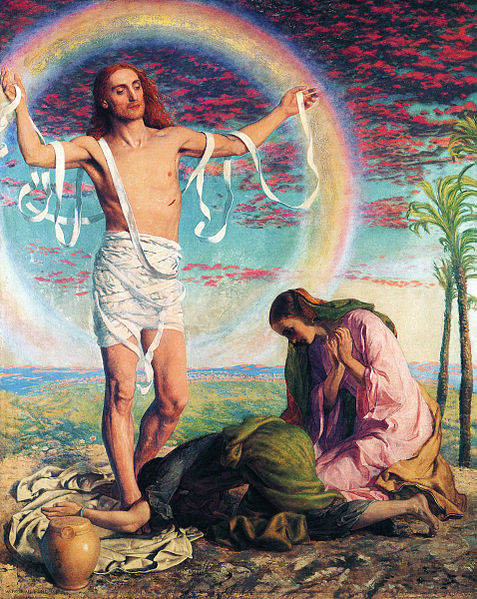Theme Essay by Jennifer Jean
Why It’s So Hard to Convey Spiritual Reality
 In March 2012, in a sweet hotel in Tyngsborough, Massachusetts, I woke up after midnight. I went to the bathroom, flushed the toilet, washed my hands. I switched off the light and returned to bed—and saw Jesus standing over my sleeping roommate.
In March 2012, in a sweet hotel in Tyngsborough, Massachusetts, I woke up after midnight. I went to the bathroom, flushed the toilet, washed my hands. I switched off the light and returned to bed—and saw Jesus standing over my sleeping roommate.
It was magnificent. And scary. And I don’t know how to write about it.
As a poet and a Christian, I know I’ve struck gold—that’s why the urge to pin down this encounter won’t leave. Yet, for months I’ve been bungling along with a horrible draft. Nothing in it sounds right; everything in it sounds trite. Even that rhyme-y sentence has entered Cheeseville.
How do I narrow this fantastic, first-time phenomena into a poem that’s both accurate and a pleasure to read? I don’t know if the experience was meant to make me confront how to write about it. I only know that the “how” seems inseparable from the visitation's meaning.
• • •
As I wrestle with understanding the reality of what I saw, detecting and circumventing sentimental verse feels crazy hard. “Sentimentality about nature denatures everything it touches,” Jane Jacobs wrote in her classic The Death and Life of Great American Cities. Whether the topic is nature, romantic love, beauty, or faith, schmaltz seems to attach itself to such writing like a leech.
I saw the prevalence of sentimentality in faith-based poetry when I taught a Sacred Poetry workshop a few years ago. I had trouble locating enough twenty-first-century “sacred,” “spiritual,” or “religious” work to admire and share. Every poem I came across seemed gushy and uncrafted. Take this excerpt from “When God Wants to Drill a Man” by Anonymous on the Christian website The Truth Renaissance:
When He yearns with all His heart
To create so great and bold a man
That all the world shall be amazed,
Watch His methods, watch His ways!
This sounds like a cheery “Congrats, Grad!” Hallmark card. I’ve also seen the equivalent with a somber twist, as in this excerpt from “What Christ Is to Us” by another Anonymous on the website Christian Poetry:
 The Shield from every dart;
The Shield from every dart;
The Balm for every smart;
The Sharer of each load;
Companion on the road.
This poem abuses its form, as does most of the faith-themed work I’ve encountered. In using a consistent meter, Anonymous makes a sing-songy cage for an abundance of bland phrases, rhymes, and images.
After my own visitation from Jesus, I remembered—with chagrin—all this poetic dross. I started searching harder, and hungering even more, for a fuller array of well-written work on faith and faith phenomena. Like most writers, when I need to know how to best write my own poem, I survey writing that’s succeeded in expressing what I want to say.
And there is wonderful faith-themed work available, if you look for it, by writers as diverse as Mark Jarman, Mary Karr, Lucille Clifton, and Gregory Orr. Clifton’s work is particularly effective. Consider this excerpt from "praise song” in her 2000 collection Blessing the Boats:
Praise to the faith with which she rose
after some moments then slowly walked,
sighing, back to her family.
I love how Clifton chose extremely basic phrasing to convey the ebb and flow of faith. This aspect of faith can only be conveyed by a poet who takes the time to be, in critic Hilary Holladay’s words, “clearly complex.” Here’s my favorite Clifton poem, “telling our stories” (from her 1996 collection The Terrible Stories):
the fox came every evening to my door
asking for nothing. my fear
trapped me inside hoping to dismiss her.
She implies that the fox is a supernatural being. This is remarkable, given that Clifton really did meet this animal. In her 2010 Poetry Foundation interview with Holladay, she says, “Well, these are fairly accurate poems. I mean, it became metaphor for me.” Clifton refers to the fox as her personal totem as well as a catalyst for her to understand fear as a tangible thing.
Like Clifton’s visiting fox, my visiting Jesus was real. But, because “His countenance was like lightning,” (Matt 28:3), do I really have only surreal tropes to play with? Those tropes could make the whole shebang seem imagined or symbolic when its reality is a crucial element of my experience. If readers have room to believe that this was in any way not real, their understanding of my own poem changes.
Later in “telling our stories,” Clifton’s fox tells tales to her “tribe.” This is obviously an imagined extension of the actual experience. Its reality was not at stake for this poet—but it is at stake for me.
• • •
At one point, I wanted to prove Jesus really could visit me. I wanted to get scientific in my poem. So, I chatted over coffee with my friend Laurette Folk, who is a former engineer, physics teacher, and freelance writer of physics textbooks. Laurette (a lapsed Catholic now exploring Buddhism) told me the visitation was akin to a shattering wine glass.
 “Every object has a natural frequency,” she explained. So when something makes it vibrate—as with a wine glass, an opera singer’s high note—“the object will vibrate a certain number of oscillations per unit of time.” When the vibrations in the glass match its natural frequency, “resonance occurs”—and that’s when the glass breaks.
“Every object has a natural frequency,” she explained. So when something makes it vibrate—as with a wine glass, an opera singer’s high note—“the object will vibrate a certain number of oscillations per unit of time.” When the vibrations in the glass match its natural frequency, “resonance occurs”—and that’s when the glass breaks.
Laurette suggested I might have changed my natural frequency at that hotel; that by meeting “certain ideal conditions,” I might have matched the frequency of the place and was, therefore, transformed. I was suddenly able to see in a new way.
Or was I able to see what was there already?
Here’s my problem: The analogy of a shattering wine glass, although useful, could lead me to narrative, to the “conditions” necessary, and a narrative of that day would include: The Joy Source Women’s Retreat I was attending at the Stonehedge Inn, the presentation on “Job Burnout” that shook me to my marrow, the yoga class led by my roommate Michelle Gallant, the clear and clean place itself. There’s more: I’d prayed with my husband on the phone before bedding down, and we were so open hearted with each other. He was genuinely glad I’d taken the time to rejuvenate.
This is good stuff, right? But if I included all this story, I’d lose the overwhelming immediacy I want to convey. The long form doesn’t suit this content. It’d just get longer with every detail. Poetry requires compression. On the other hand, with compression, I walk a fine line between surreality and veracity—how much can I expect my reader to unpack?
• • •
Maybe my answer can’t, entirely, be craft-oriented. Poetry isn’t entirely a crafted thing. To create, we put ourselves into a particular state of being. We return to vividly experienced moments to flesh out abstractions or altered states that are very hard to express in words.
Therefore, to write my poem well is to return to Jesus. As a writer, no matter my fear and resistance, I can’t help but return to the moment, returning and returning and returning. I need to revise! And to fight for accuracy, which is a way of treating the experience with dignity.
Writing the poem also means giving the experience to others—and part of me doesn’t want to. He came to me. But ultimately, the kind of writing I endeavor to create isn’t all about me. I can’t help but make this experience available to others.
This availability means I add the specifics of my little life to a larger conversation about the spirit realm and the nature of faith. It means that, as an artist, I am responsible for maintaining the dynamism of public, or tribal, conversations.
• • •
“Poetry is rewriting the language of faith—religion should take note,” said poet Christian Wiman in a recent public radio interview. In Wiman’s 2013 book My Bright Abyss: Meditation of a Modern Believer, he writes:
It can be very difficult to retain any faith in that original moment of inspiration at all. The memory of that momentary blaze, in fact, and the art that issued from it can become a reproach to the fireless life in which you find yourself most of the time…. To expect grace is one thing; to integrate it into your life is quite another.
I think it’s fair to say that gushy-faithy writing is evidence of unprocessed, unlived, and ungiven grace.
And I can’t judge the multitudes writing like this—I’m in their ranks, as you’ll see in the lines I’ve excerpted from my poem-in-process below. But I know I have a choice about when to stop revising; we all do. I’m choosing to keep it up until the poem itself will have “a countenance like lightning.”
What makes the light
real? Details
won’t help. The folded puff
of the thrown-back comforter?
The blue velveteen airplane
pillow from home?
My friend, Michelle Gallant,
belly down—at the wall—
on her side of the shared bed?
The distance
in yards or leaps
between my feet and the bed;
between the foot of the queen-size
and the brocade-shaded
window? Some poets would say, Add more.
Would ask, What makes it magical?
When it’s nothing. The light is
real.
Publishing Information
- The Death and Life of Great American Cities by Jane Jacobs (Random House, 1961).
- "When God Wants To Drill A Man" by Anonymous, The Truth Renaissance (no publication date).
- "What Christ Is to Us" by Anonymous, Christian Poetry (no publication date).
- Blessing the Boats: New and Selected Poems 1988-2000 by Lucille Clifton (American Poets Continuum, BOA Editions, 2000).
- The Terrible Stories by Lucille Clifton (American Poets Continuum, BOA Editions, 1996).
- "She Could Tell You Stories," Lucille Clifton Interviewed by Hilary Holladay, Poetry Foundation, February. 2010.
- "Poetry and Spirituality at Death’s Door,” Christian Wiman interview, On Point with Tom Ashbrook, WBUR, April 5, 2013.
- My Bright Abyss: Meditation of a Modern Believer by Christian Wiman (Farrar, Straus and Giroux, 2013).
Art Information
- "To Beseech Thee" © Angelo Juan Ramos; Creative Commons license.
- "Christ and the Two Marys" by William Holman Hunt; public domain.
- "Christ the Pantocrator" by Metropolitan Jovan Zograf, circa 1384; public domain.
 Jennifer Jean is an award-winning writer who has published four collections of poetry—her most recent book is The Fool (Big Table, 2013). Her poems, essays, and book reviews have appeared in numerous literary journals and anthologies, including Drunken Boat, Tidal Basin Review, Denver Quarterly, Caketrain, Poetica, and The Mom Egg Review.
Jennifer Jean is an award-winning writer who has published four collections of poetry—her most recent book is The Fool (Big Table, 2013). Her poems, essays, and book reviews have appeared in numerous literary journals and anthologies, including Drunken Boat, Tidal Basin Review, Denver Quarterly, Caketrain, Poetica, and The Mom Egg Review.
Jennifer is a volunteer blogger for Amirah, an advocacy group for sex-trafficking survivors; a principal organizer of the Massachusetts Poetry Festival; and a teacher of writing and literature at Salem State University. She lives in Salem, Massachusetts, with her husband and two children.
To find out more about her work with Amirah and her writing, visit Jennifer’s website Fishwife Tales.
